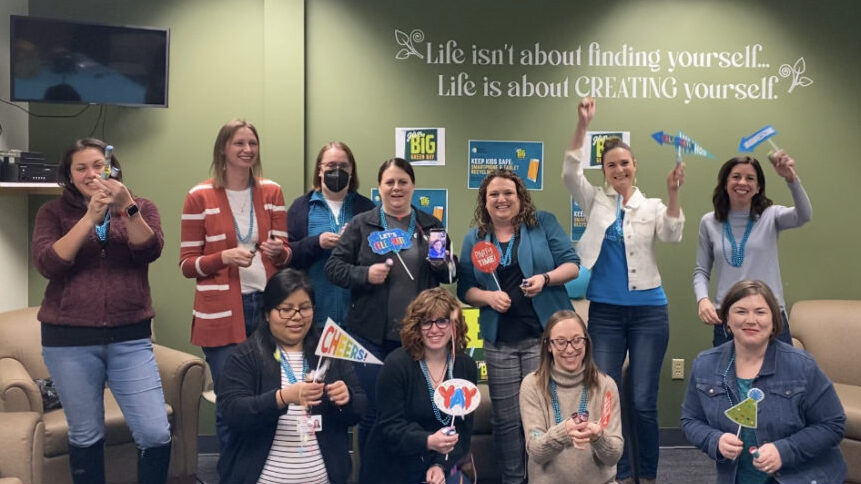Commitment to Trauma Informed Care Creates Transformation in Brown County

2023 marks 15 years of Wellpoint Care Network being at the forefront of the Trauma Informed Care (TIC) movement. During that time, more than 75,000 people have learned about our approach and the Seven Essential Ingredients of Trauma Informed Care (7ei). Additionally, more than 750 individuals have taken our Train the Trainer certification course, ensuring that these cutting-edge concepts are being shared with others.
In Brown County, two of those trainers are Tana Koss and Heather McGriff from Family Services of Northeast Wisconsin. Family Services is a non-profit, human services agency that offers programs that support children, teens and adults during challenges and transitions in their lives.
“When we committed to being a Trauma-informed agency, we knew it was going to be a journey, not a destination,” said Koss. Family Services found Wellpoint Care’s range of programming a good fit for their needs, spanning from community-based to clinical.
“We’ve stuck with it because it’s vetted, it gets updated and we have the resource of experts, which has felt supportive.”
providing common language and tools
Koss and McGriff were first certified in 2016, and have been re-certified three times since. To date, they’ve led more than 25 trainings in the Northeast Wisconsin area, including both Family Services staff and members of the community. They plan to continue trainings as often as possible.
“It’s really helped us to have a language we can all work from, and have a factual backing to a lot of things we’ve known for a long time,” said McGriff. “That’s really helped us create a space where we can have conversations with clients, all the way up to our teams and leadership, as well as places in the community.”
“When we ask people what they’re looking for, they want to know how to apply the theories and the philosophy,” said McGriff. “Wellpoint Care’s model is really strong in that way. People leave feeling like they have a toolbox of what to do now.”
shifting perspectives On Care
Koss and McGriff highly recommend Trauma Informed Care training because they’ve seen first-hand the changes it can have within an organization. The impact has been apparent in all aspects of Family Services, especially when it comes to client care.
“It really has been a two-fold improvement,” said McGriff. “The staff are less stressed about having to interact with kids that can be challenging at times, and the kids feel like they’re in such a more supportive environment.”
They recall the story of a young client who would climb onto the roof when upset. Prior to trauma-informed training, staff would regularly get into power struggles with him about safety. Once the staff had learned more about regulation, they began to ask why he liked being up there.
“It turns out he didn’t feel so claustrophobic when the wind was blowing in his hair,” said McGriff. “So, we gave him a fan in his room he could use when he got upset. He would be ready to go back to programming as soon as he was able to feel that wind.”
shifting organizational perspectives
While there was some initial hesitation when first introducing these trauma-informed practices, Koss and McGriff believe it’s all been worth it in the long run.
“From that old traditional viewpoint, giving a child something to help regulate them is rewarding them for their behavior,” said McGriff. “But you have to get regulation first. The staff were able to eventually adjust to that perspective, and now it’s kind of like a mantra: ‘Let’s get them regulated, and we’ll figure out the consequences on the tail end.'”
The results speak for themselves: the Family Services residential program has experienced a significant drop in both physical interventions and police contacts since they began applying trauma-informed strategies. The changes have also had a positive impact on staff retention and happiness.
“If we have a mandatory training, the message might still be delivered that it’s mandatory, but there’s an opt out option depending on the content of the material,” said Koss. “I don’t think that would have happened pre-trauma informed care lens.”
Last year, the agency rolled out a sabbatical benefit to promote better work-life balance for employees. A lot of thought was put into the program to ensure the time would be taken as it was intended.
“You’re required take it all at once, and it’s treated as if you literally can’t log in at all,” said Koss. “By making it mandatory, there wasn’t any guilt involved. It’s all about that Caregiver Capacity.”
Even 15 years after their first exposure to Trauma Informed Care concepts, Koss and McGriff are still discovering new material and applications. They’re also surprised to still be encountering people with zero knowledge of the concepts.
“That’s what motivates me to keep going,” said McGriff. “We’ve seen impact at the agency level, facilities, programs, client care. I think there’s some internal motivation that we have to be a part of the community movement more.”








